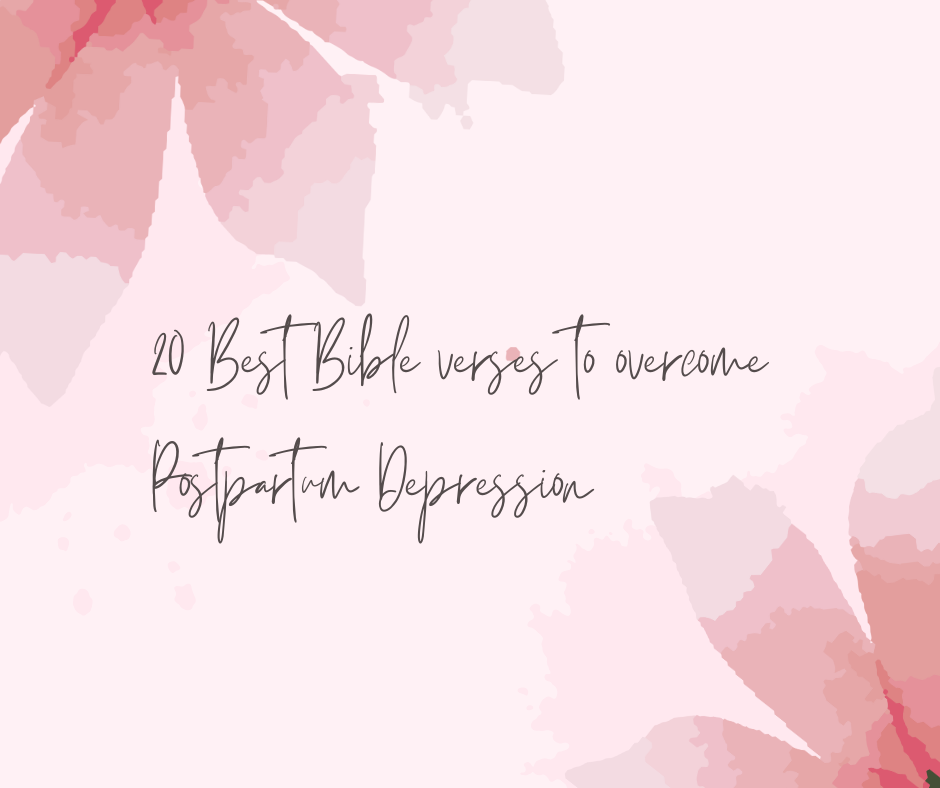Bible verses to overcome postpartum depression
Postpartum depression is common among 15% of new moms. However, even if you fall among this 15% who are currently having postpartum depression, I want you to know that you are not alone. God’s love, joy, and peace are available to fill your heart and to make you a joyful mother of children.
Aside from other causes of depression, there is a spiritual side of it that most people do not believe exists even if they are told. You can be victorious with these bible verses to overcome postpartum depression. However, no matter the cause of your postpartum depression symptoms, I want you to know that your child is god’s gift to you and he wants you to be happy and healthy as you raise the child.
3john 2 says, “Beloved, I pray that in every way you may succeed and prosper and be in good health [physically], just as [I know] your soul prospers [spiritually].”
God is not only concerned about your spirit, he also delights in your physical and emotional wellness and that of your baby. You are not a mistake neither is your baby an accident. You both were part of God’s plan before heaven and earth existed.
Therefore, you have nothing to fear. God wants you to live above fear, depression, anxiety, sadness, irritation, and all symptoms of depression. He wants you to live a happy life using these bible verses to overcome postpartum depression.
God has made a lot of promises to you in his word and here are some bible verses to overcome postpartum depression.
The spiritual side of Postpartum depression
John 10:10 declare, “The thief comes only in order to steal and kill and destroy. I came that they may have life, and have it in abundance [to the full, till it overflows”
Depression is one of the weapons that the devil uses in stealing, killing, and destroying our joy as humans. It’s not part of God’s plan for our lives yet the devil introduces it into our lives so that we can be limited if not cut off in achieving the purpose of God for being on earth. Depression is a weapon in the devil’s hand to afflict us but you have a much more powerful weapon in your hand and this weapon is the word of God.
For the weapon of our warfare are not carnal but they are mighty through Christ for the pulling down of strongholds, casting down every imagination, and bringing every high thing to the obedience of Christ. These bible verses to overcome postpartum depression are your weapons.
This is what the weapon of the word of God will do for you, helping you to overcome the devil, his weapons, and his tactics. Although you might not be able to prevent postpartum depression, the Goodnews is that you are more than a conqueror in Christ Jesus because he has overcome the world for you.
It’s good to see the doctor for treatment, yes! It’s an important step that you must take. However, confronting depression with the word of God is the ultimate solution and healing strategy. These bible verses to overcome postpartum depression are for you
Bible verses to overcome postpartum depression
- Ephesians 6:12
“For our struggle is not against flesh and blood [contending only with physical opponents], but against the rulers, against the powers, against the world forces of this [present] darkness, against the spiritual forces of wickedness in the heavenly (supernatural) places.”
- John 10:10
“The thief comes only in order to steal and kill and destroy. I came that they may have life, and have it in abundance [to the full, till it overflows”
- 1John 4:4
“Little children (believers, dear ones), you are of God and you belong to Him and have [already] overcome them [the agents of the antichrist]; because He who is in you is greater than he (Satan) who is in the world [of sinful mankind].”
- Roman8:28
“And we know [with great confidence] that God [who is deeply concerned about us] causes all things to work together [as a plan] for good for those who love God, to those who are called according to His plan and purpose.”
These bible verses to overcome postpartum depression are your weapons of warfare. You should, therefore, engage them in fighting against the devil.
- James 1:5
“If any of you lacks wisdom [to guide him through a decision or circumstance], he is to ask of [our benevolent] God, who gives to everyone generously and without rebuke or blame, and it will be given to him.”
- Proverb 3:5-6
[5] Trust in the LORD with all thine heart; and lean not unto thine own understanding.
[6] In all thy ways acknowledge him, and he shall direct thy paths.
- 2corinthian 12:9
But he said to me, “My grace is sufficient for you, for my power is made perfect in weakness.” Therefore I will boast all the more gladly about my weaknesses, so that Christ’s power may rest on me.
- Philippians 4:19
And my God will supply all your needs according to His glorious riches in Christ Jesus.
- 2Timothy 1:7
For the Spirit God gave us does not make us timid, but gives us power, love and self-discipline.
- Romans 8:1
So now there is no condemnation for those who belong to Christ Jesus.
More Bible verses to overcome postpartum depression
- 1Samuel 1:27
I asked the LORD to give me this boy, and he has granted my request.
- Matthew 11:28-30
28 “Come to me, all you who are weary and burdened, and I will give you rest. 29 Take my yoke upon you and learn from me, for I am gentle and humble in heart, and you will find rest for your souls. 30 For my yoke is easy and my burden is light.”
- Romans 5:3-5
3 Not only so, but we[a] also glory in our sufferings because we know that suffering produces perseverance; 4 perseverance, character; and character, hope. 5 And hope does not put us to shame, because God’s love has been poured out into our hearts through the Holy Spirit, who has been given to us.
- John 15:4
Remain in me, as I also remain in you. No branch can bear fruit by itself; it must remain in the vine. Neither can you bear fruit unless you remain in me.
- Psalm 56:3
But when I am afraid, I will put my trust in you.
- Psalm 73:26
My health may fail, and my spirit may grow weak, but God remains the strength of my heart; he is mine forever.
- 2corinthian 4:15-16
15 All this is for your benefit, so that the grace that is reaching more and more people may cause thanksgiving to overflow to the glory of God.
16 Therefore we do not lose heart. Though outwardly we are wasting away, yet inwardly we are being renewed day by day.
- Isaiah 41:10
Don’t be afraid, for I am with you. Don’t be discouraged, for I am your God. I will strengthen you and help you. I will hold you up with my victorious right hand.
- Isaiah 66:13
As a mother comforts her child, so will I comfort you; and you will be comforted over Jerusalem.”
- Philippians 4:6-7
Don’t worry about anything; instead, pray about everything. Tell God what you need, and thank him for all he has done. Then you will experience God’s peace, which exceeds anything we can understand. His peace will guard your hearts and minds as you live in Christ Jesus.
- Galatians 6:9-10
9 Let us not become weary in doing good, for at the proper time we will reap a harvest if we do not give up. 10 Therefore, as we have an opportunity, let us do good to all people, especially to those who belong to the family of believers.
Conclusion
Taking care of a newborn coupled with other family chores can be breathtaking and painstaking. However, I want you to know that your duties as a mom are a service unto the lord with reward and you need to do it with joy. You should know that God cares about your mental health.
I know that it’s not easy but the spirit of God is available to help you as you trust him and depend on him daily. You are planting a seed of love into the heart of your little one and your labor of love will not be in vain. Keeping a constant daily relationship with God will help you to lead a joyful and happy life for your children to emulate.

